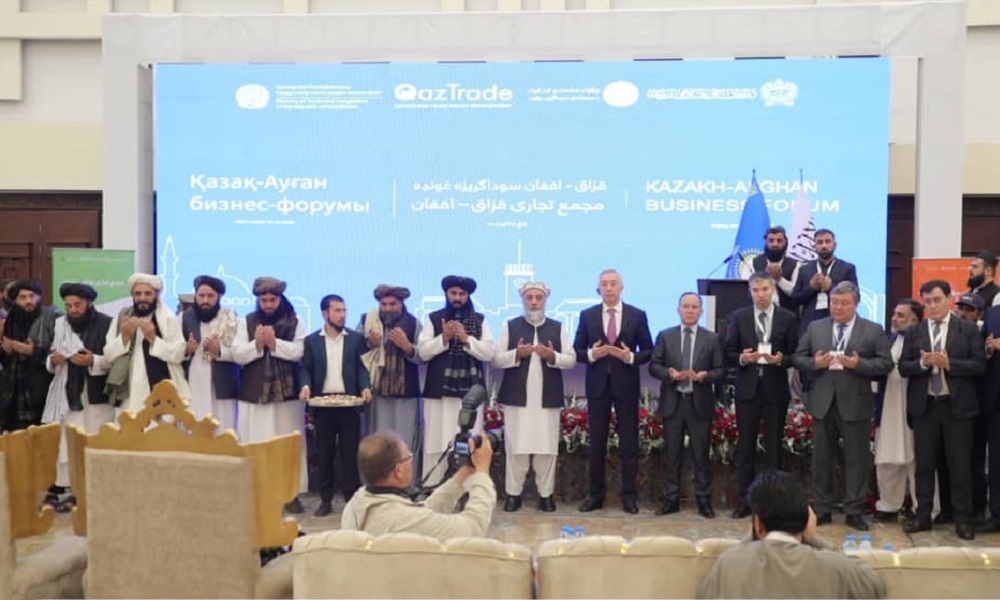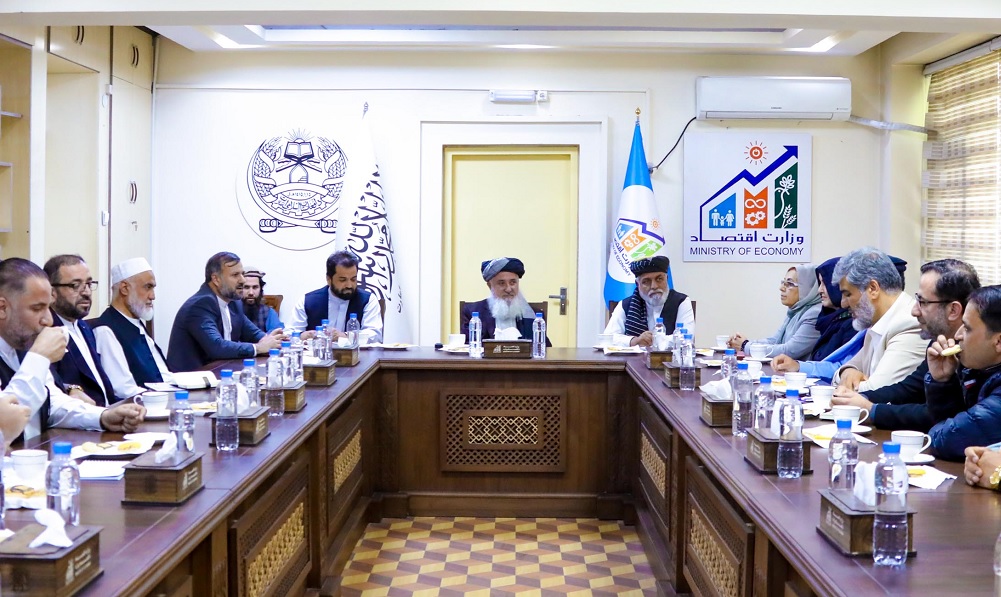Business
NUG Fails on Fighting Corruption, Spending Budget: Experts

 Scores of political experts have stated the National Unity Government has failed to fight corruption significantly, saying the Afghan leaders would attend Brussels conference empty handed, amid officials in Presidential palace have confessed that corruption still remains as big barrier rooted in all over the Governmental departments.
Scores of political experts have stated the National Unity Government has failed to fight corruption significantly, saying the Afghan leaders would attend Brussels conference empty handed, amid officials in Presidential palace have confessed that corruption still remains as big barrier rooted in all over the Governmental departments.
Meanwhile officials in Ministry of Finance have also mentioned that the Ministries only could spend their 30 percent of the allocated development budgets during 9 months of the fiscal year.
One of the two key per conditions of the International community in London and Tokyo conferences for the continuation of the aids for Afghan Government were combating corruption and spending of the development budgets by the Governmental departments of Afghanistan, during the two years despite of dozen different cases were trailed, but few cases of corruption were reviewed.
President senior advisor in corruption affairs Sardar Mohammad Roshan said,” corruption has rooted deep in all the Governmental departments of Afghanistan, but the National council combating corruption office will not leave one corruption case without reviewing.”
The total amount of the common and development budgets for the Afghanistan Governmental departments allocated 455,5 billion Afghani where 293 billion Afghani goes to common budget and 162 billion goes to development budget for the current fiscal year, however Afghan Government had promised to the International community to have the allocated development budget up to 60 percent by coming the Brussels conference, this indicates that the Government has failed to do so.
Meanwhile Ministry of Finance Spokesman Ajmal Hamid Abdul Rahimzai said,” We have allocated 55 percent of the development budget and in general only 30 percent of the development budget has been consumed.”
Political experts believed that the National Unity Government of Afghanistan has not only failed to fight corruption but it could only spend the 30 percent of the development budget by 9 months, these two issue will discourage the International community to stop their financial aids for Afghanistan in Brussels conference.
Political expert Rahmatullah Bezhanpor said,” huge number of educated persons are jobless whereas that the Ministers in Governmental departments to spend their allocated budgets, this indicates their poor capability and weak points.”
World will witness the Brussels conference in 5th of Oct 2016 and the International community will once again announce their continuation of the aids to Afghanistan.
Reported by Ahmad Farshad Saleh

Business
Afghanistan’s growth prospects remain uncertain amid global uncertainty: World Bank report
According to the report, in Afghanistan, despite aid cuts, the economy is estimated to have grown by 2.5 percent in FY24-25, which was slower than the pace of population growth.

Amid increasing uncertainty in the global economy, South Asia’s growth prospects have weakened, with projections downgraded in most countries in the region, including Afghanistan.
Stepping up domestic revenue mobilization could help the region strengthen fragile fiscal positions and increase resilience against future shocks, said the World Bank in its twice-yearly regional outlook – the South Asia Development Update – which was released on Wednesday.
According to the report, in Afghanistan, despite aid cuts, the economy is estimated to have grown by 2.5 percent in FY24-25, which was slower than the pace of population growth.
Growth is forecast to increase only moderately to 2.2 percent in 2025/26, the World Bank report stated.
Coinciding with the release of the South Asia report was the World Bank’s Afghanistan Development Update report which explained the situation in more detail.
Stating that while the country’s economy is gradually recovering, the outlook remains uncertain due to growing fiscal pressures, a widening trade deficit and persistent poverty and food insecurity.
The report stated that these factors continue to strain households and hinder inclusive growth.
However, Afghanistan recorded its second consecutive year of growth in 2024, the World Bank stated, adding that the recovery was largely driven by the agriculture sector.
Manufacturing and services remained subdued due to an unfavorable business environment, persistent export barriers and declining foreign aid.
Modest gains in private consumption and real estate investment contributed to growth, the report stated, adding that rising imports widened the trade deficit, increasing external vulnerabilities.
At the same time, rapid population growth and the return of refugees continue to strain job creation and public service delivery, further deepening the fragility of the economy.
Deflation meanwhile persisted in 2024, with food prices having declined sharply. Non-food inflation remained stable. Persistent deflation continued in 2024,
Poverty, food insecurity, and malnutrition however remained pressing challenges and despite modest wage growth, high unemployment and restrictions on women continue to strain livelihoods, the report stated.
Early this year, 14.8 million people faced food shortages, while acute malnutrition – now affecting 4.7 million women and children – is worsening. The World Bank warned that without urgent action, human capital development will be further undermined.
Fiscal pressures meanwhile remained high as domestic revenue mobilization, though relatively strong, is insufficient to offset the sharp decline in aid.
The report also stated that exports declined in 2024, while imports surged – widening the trade deficit.
The increase in imports however was driven by rising industrial demand and substitution of domestic consumer goods.
The afghani (AFN) currency, which had appreciated significantly in 2023 due to strong foreign inflows stabilized with slight depreciation in 2024 but the banking sector remained fragile.
The World Bank reported that economic growth is expected to slow to 2.2 percent in 2025 amid aid disruptions, before gradually recovering to 2.5 percent in 2026–27.
The organization however warned that while Afghanistan’s youth remain a vital source of resilience and untapped potential, urgent action to expand job opportunities for them is needed.
Business
Afghanistan-Kazakhstan trade soars by 32%, target set at $3 billion, says Azizi

Acting Minister of Industry and Commerce, Nooruddin Azizi, stated at the end of the first day of the Kazakh-Afghan trade exhibition that trade volume between the two countries has increased by 32 percent.
He added that both sides aim to raise bilateral trade to $3 billion.
According to a statement from the Ministry of Industry and Commerce, Azizi welcomed the visit of the Kazakh delegation to Afghanistan and expressed appreciation for Kazakhstan’s humanitarian assistance, support, and collaboration, including in the area of digitalizing Afghan government institutions.
Azizi emphasized the importance of connecting Central Asia to South Asia through Afghanistan and discussed expanding trade agreements, holding exhibitions of products and goods in both countries, establishing trade centers in Kabul and Almaty, and facilitating exports and imports between the two nations.
Kazakh Deputy Prime Minister Serik Zhumangarin also stressed that Afghanistan and Kazakhstan are key strategic partners in the region. He described the holding of the business forum as significant for enhancing economic cooperation, establishing new trade relations, exchanging experiences, and promoting joint initiatives.
Zhumangarin stated: “We believe a stable and prosperous Afghanistan is a key factor for peace and stability in the region and has the potential to become a major logistical hub connecting Central and South Asia.”
The exhibition of Kazakhstani products and goods was held at the invitation of the Ministry of Industry and Commerce, with the participation of 25 Kazakh companies.
Business
Acting Minister of Economy meets with Afghan businessmen abroad

Qari Din Mohammad Haneef, Acting Minister Economy, has met with a number of Afghan businessmen and experts living in Germany, France, Italy, Britain, Canada and the United States.
In a recent meeting, the economic and social situation of the country was discussed.
The Afghan businessmen and experts expressed their satisfaction with the security situation and considered the economic programs of the IEA important in improving the economic situation.
The Acting Minister of Economy, explaining the opportunities and facilities available to attract investment in various sectors, called on all Afghan businessmen living abroad to use these opportunities and invest within the country in order to improve the economic situation and create job opportunities.
-

 Sport4 days ago
Sport4 days agoAfghanistan qualify for U19 Cricket World Cup 2026
-

 Regional5 days ago
Regional5 days agoDeadliest US strike in Yemen kills 74 at oil terminal, Houthis say
-

 World4 days ago
World4 days agoThousands of protesters rally against Trump across US
-

 World4 days ago
World4 days agoIran, US end nuclear talks in Rome, agree to meet next week
-

 Latest News4 days ago
Latest News4 days agoPolio vaccination campaign launched in Afghanistan
-

 International Sports4 days ago
International Sports4 days agoIPL 2025: 14-year-old Vaibhav Suryavanshi becomes youngest IPL player
-

 Latest News2 days ago
Latest News2 days agoChina invites various Afghan delegations to attend Shanghai forums
-

 International Sports2 days ago
International Sports2 days agoIPL 2025: Robo-Dog ‘Champak’ explained














